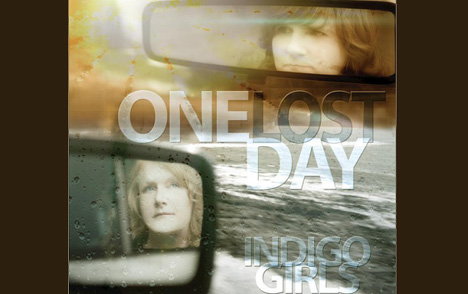Femme-folk rockers Amy Ray and Emily Saliers have known each other since elementary school and have been playing as a duo since their high school years in the early ‘80s. How’s that for staying power?
For the past 30-something years, they’ve carefully honed their own sound, blending elements of folk, country, rock, pop, and even punk into a homespun sonic tapestry similar to that of Melissa Etheridge and Sheryl Crow. Neither has formal music training—both hold degrees in English, and Ray also holds a bachelor’s in religious studies—but the mechanics of music theory or esoteria of formal analysis would have been wasted on these DIY-oriented, activist-minded musicians. It’s no surprise that two English majors would rather draw from their roots, taking a narrative standpoint toward the world around them.
The Georgia duo was signed by Epic during a time—the late ‘80s and early ‘90s—when female artists were seeing an upsurge of commercial success and attention. Seeing the success of female frontwomen like Natalie Merchant (10,000 Maniacs) and Tracy Chapman, Epic felt emboldened and signed the Indigo Girls in 1988. With the support of a major label, the Indigo Girls almost immediately went on to win a Grammy Award for Best Contemporary Folk Album in 1990.
While the two have independent lives—Ray has pursued a parallel solo career, and Saliers has explored writing, film scoring, and restaurant ownership–they’ve never stopped collaborating and have consistently released an album every few years since their inception as a duo. Throughout their career, they have explored various territories, varying stylistically from time to time but never fully departing from the folk genre. Within that spectrum, “One Lost Day” is comfortably centrist, rife with autobiography, and moving fluidly between folk and pop.
Opening with a thick snare fill by Brady Blade (brother of jazz drummer Brian Blade), “Elizabeth” is earthy and grounded. The line, “We were young / but not that young,” appears several times in reference to a series of coming-of-age events, from marriage to an informal childhood “blood sister” ceremony. As tradition dictates in the South, they raise their glasses of whiskey and salute the past—Georgia-style.
“Happy in the Sorrow Key,” which is about Ray’s recent loss of her father, sounds almost like Veruca Salt with Bruce Springsteen’s touring band from the mid-‘80s until Jordan Hamlin—this album’s producer—enters on several wind instruments, including horn, trumpet, and clarinet. The end product is a unique, quasi-baroque brand of garage-band rock.
Moving strongly toward pop, “Southern California is Your Girlfriend” sticks out the way “Try, Try, Try” sticks out on Smashing Pumpkins’ “Machina.” Higher-pitched and peppy drums, coupled with clean production and some gentle ambient guitar effects, make for a firm departure from folk without completely severing the connection: acoustic-guitar-driven and richly harmonized, it’s another retrospective song about lost love.
“Texas was Clean” highlights the ease with which Ray and Saliers harmonize. With rolling drums in the background, Hamlin picks up a dobro to double the duo’s finger-picking, evoking the hot, dusty landscape of the Lone Star State.
One of a few historical songs on the album, the subdued folk-rock of “Alberta” tells the story of a natural disaster that occurred in a small mining town in Canada. Then the duo finally lets loose with “Olympia Inn.” Ray’s vocals have a little dirt under the fingernails, and Saliers is the Louise Post to Ray’s Nina Gordon.
With Carol Isaacs backing her up on piano, Saliers takes the lead in the withdrawn “If I Don’t Leave Here Now,” wherein she claims that she “will never get out of this place” if she doesn’t do as the song title suggests.
Ray steps up with “Spread the Pain Around,” and hearing the duo alternate taking the lead really does contrast Ray’s smoker’s lung grit with the lighter, more casual feel of Saliers’ voice.
Similar to “Southern California is Your Girlfriend,” “Learned It on Me” is heavily poppy, and if any song leans a little too far in that direction, it’s this one. Hamlin’s synth work is a little more bloopy than necessary. While she was given a lot of leeway production-wise—and while she largely proved herself to be trustworthy—she took questionable liberties with “Learned It on Me.” It’s hard to argue that she ruined the song by any means, but it sure sticks out like a yarmulke in a dive bar.
Moving back into folk-rock, Ray’s mandolin is prominent in “Rise of the Black Messiah,” which is a biting social critique—one of the Indigo Girls’ specialties. The whole band rises and surges, rocking as hard as they will on “One Lost Day,” carried by the emotional swell of the lyrics: “All of them lynchers are gonna be damned / And outta that hole walks a brand new man.” That lyric hits hard in supposedly (read: “not”) post-racial America. It particularly feels like a punch in the gut in racially-homogenized Utah, with its unabashed Anglo-Saxon centricity and notoriously slippery politics; the region has even gone so far as to ignorantly glamorize the “Dixie” in which the atrocities described in the song were committed.
“Findlay, Ohio 1968” feels a bit like Sufjan Stevens, both in its spatiotemporally specific title as well as its introductory chamber setting. Again featuring Saliers, it looks back upon a childhood memory, this time remarking about both what could have been as well as noting the social violence that was soon to come.
In the penultimate track, Ray returns to center stage, her southern twang and husky rasp contrasting sharply against Saliers’ sweeter tone. While she also appears here on piano, trumpet, and electric guitar, it’s Hamlin’s pedal steel work that really makes “Fishtails” shine.
“Come a Long Way” ends with the same nostalgia that both begins and permeates the album, and it’s the most balanced and natural-feeling (and, therefore, effective) blend of pop and folk. Acoustic guitars still take center stage, but both orchestration and production lean tastefully toward something that Paula Cole might have done.
Some acts that have been around as long as the Indigo Girls are now trying to make a comeback, whereas this duo never quit. “One Lost Day” doesn’t break the rules or redefine a genre, but Ray and Saliers have again succeeded in staying true to themselves without stagnating, remaining stylistically grounded without dating themselves or resorting to shtick. “One Lost Day” reflects the maturity and depth of writing that the Indigo Girls have cultivated and demonstrates how easily they can still write songs with substance. They don’t rest on their laurels, nor do they resort to post-production crutches. Anyone who likes southern rock, folk, or the Indigo Girls themselves should give “One Lost Day” a listen.




